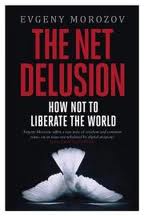Evgeny Morozov challenges the widely held view of the internet as a tool for promoting democracy in his passionate and insightful new book, reviewed by Amy Mollett.
The Net Delusion: How Not To Liberate The World. By Evgeny Morozov. Penguin. January 2011.
Find this book at: ![]() Google Books
Google Books ![]() Amazon
Amazon
 As the Wikileaks scandal rumbles slowly on, throwing up controversy and intrigue with each click, a ‘Twitter revolution’ in Tunisia has this week been heralded as playing a large part in the removal of President Ben Ali’s government, whilst in the UK a growing number of politicians are using social networking sites to reach their supporters and constituents. At every turn it seems, we are witnessing the ever-intertwining relationship between politics and the internet, and Evgeny Morozov’s new book The Net Delusion takes us right to its very heart.
As the Wikileaks scandal rumbles slowly on, throwing up controversy and intrigue with each click, a ‘Twitter revolution’ in Tunisia has this week been heralded as playing a large part in the removal of President Ben Ali’s government, whilst in the UK a growing number of politicians are using social networking sites to reach their supporters and constituents. At every turn it seems, we are witnessing the ever-intertwining relationship between politics and the internet, and Evgeny Morozov’s new book The Net Delusion takes us right to its very heart.
But as the title suggests, Morozov aligns himself not with the popular view of the internet as a tool for the promotion of democracy, but as something which has the potential to easily unravel it. Hillary Clinton may have notably argued that “internet freedom” is vital to the spread of democratic values throughout the world, and that given the freedom to use online networking tools people “will use them to advance democracy and human rights”, but Morozov takes up the exact opposite view, proposing that the internet is heavily employed to strangle democracy and that we must shift ourselves from a cyber-utopian outlook to one of cyber-scepticism.
Morozov expertly introduces the reader to a host of examples to draw out his argument, focusing on instances in which an inflated belief in the internet by the West has damaged the freedom of various groups. A key example is the supposed ‘Twitter revolution’ in Iran during the elections of June 2009. Many Western media outlets covered the story in a very specific way to highlight the role of the internet in encouraging the organisation of pro-democracy supporters. Thousands of Iranians took to the streets that summer to protest against the election results, but Morozov stresses that a larger number supported the result and that this consensus was subject to a media blackout in the West. Reporters talked of students armed with Bluetooth headsets and social networking apps, and blog posts suggested that “the revolution will be Twittered“. Twitter was hailed as marking the beginning of the end of authoritarian rule, surviving and supposedly flourishing when other forms of communication had been shut down.
But it is here that Morozov exposes the dark side of new media, discussing how a government crackdown led to many users being traced and arrested through their online accounts, blogs and message boards being erased, and protest groups being virtually infiltrated and blocked. Morozov shows that as the West made frenzied promotions of the likes of Facebook and Twitter, authoritarian regimes were provoked into shutting them down, further entrenching their own dictatorships.
Morozov’s tone is often humorous and refrains from reading like an obsessive conspiracy theory; chapter headings include ‘Orwell’s Favourite Lolcat’, ‘Why the KGB Wants You to Join Facebook’, and ‘Making History (More Than a Browser Menu)’. He also displays an intricate historical knowledge and an awareness of the uses and abuses of technology beyond his 26 years, and his time growing up in Belarus, a country which has experienced its fair share of political violence and authoritarian rule, surely acted as inspiration.
There is no doubt that Morozov’s account is a passionate and dedicated one. It is highly readable, insightful, and is a thought provoking book for all readers. Morozov stands at the head of a new wave of important debate on democracy, freedom and information, offering a well informed critique of the West’s naivety which many readers will sympathise with. Now is the time for us to reject our cyber-utopianism and our internet-centrism, our Net Delusions.
Amy Mollett is a researcher for the LSE Public Policy Group.
Evgeny Morozov is giving a public lecture at the LSE on Wednesday 19th January. Find out more here.
Click here to download a podcast of the event (38 MB, MP3).





